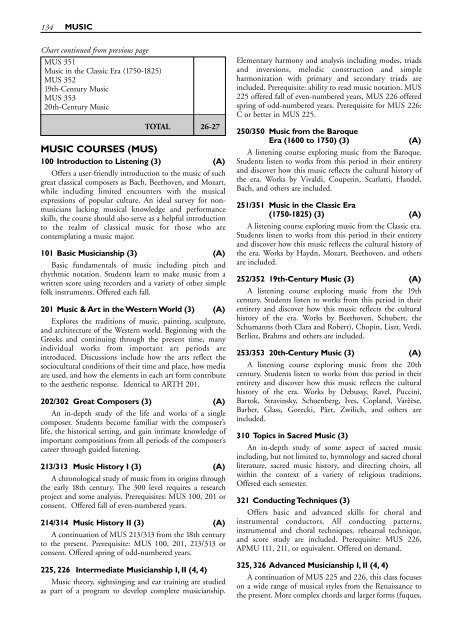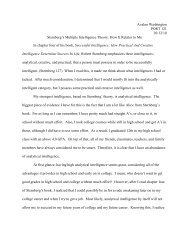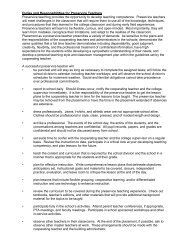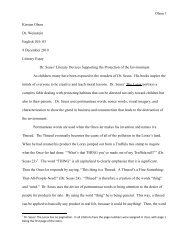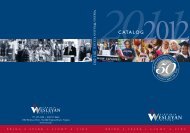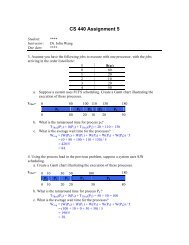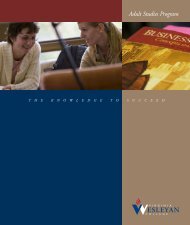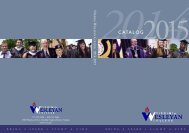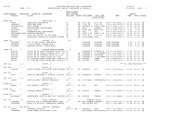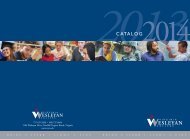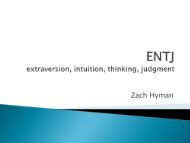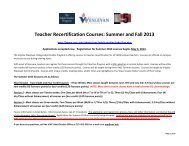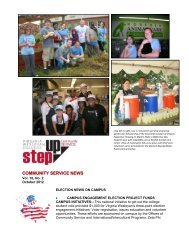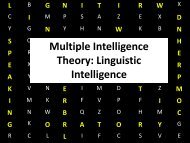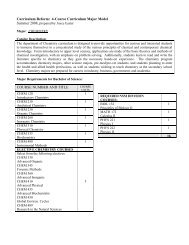134 MUSICChart continued from previous pageMUS 351Music in the Classic Era (1750-1825)MUS 35219th-Century MusicMUS 35320th-Century MusicTOTAL 26-27MUSIC COURSES (MUS)100 Introduction to Listening (3) (A)Offers a user-friendly introduction to the music of suchgreat classical composers as Bach, Beethoven, and Mozart,while including limited encounters with the musicalexpressions of popular culture. An ideal survey for nonmusicianslacking musical knowledge and performanceskills, the course should also serve as a helpful introductionto the realm of classical music for those who arecontemplating a music major.101 Basic Musicianship (3) (A)Basic fundamentals of music including pitch andrhythmic notation. Students learn to make music from awritten score using recorders and a variety of other simplefolk instruments. Offered each fall.201 Music & Art in the Western World (3) (A)Explores the traditions of music, painting, sculpture,and architecture of the Western world. Beginning with theGreeks and continuing through the present time, manyindividual works from important art periods areintroduced. Discussions include how the arts reflect thesociocultural conditions of their time and place, how mediaare used, and how the elements in each art form contributeto the aesthetic response. Identical to ARTH 201.202/302 Great Composers (3) (A)An in-depth study of the life and works of a singlecomposer. Students become familiar with the composer’slife, the historical setting, and gain intimate knowledge ofimportant compositions from all periods of the composer’scareer through guided listening.213/313 Music History I (3) (A)A chronological study of music from its origins throughthe early 18th century. The 300 level requires a researchproject and some analysis. Prerequisites: MUS 100, 201 orconsent. Offered fall of even-numbered years.214/314 Music History II (3) (A)A continuation of MUS 213/313 from the 18th centuryto the present. Prerequisite: MUS 100, 201, 213/313 orconsent. Offered spring of odd-numbered years.225, 226 Intermediate Musicianship I, II (4, 4)Music theory, sightsinging and ear training are studiedas part of a program to develop complete musicianship.Elementary harmony and analysis including modes, triadsand inversions, melodic construction and simpleharmonization with primary and secondary triads areincluded. Prerequisite: ability to read music notation. MUS225 offered fall of even-numbered years, MUS 226 offeredspring of odd-numbered years. Prerequisite for MUS 226:C or better in MUS 225.250/350 Music from the BaroqueEra (1600 to 1750) (3)(A)A listening course exploring music from the Baroque.Students listen to works from this period in their entiretyand discover how this music reflects the cultural history ofthe era. Works by Vivaldi, Couperin, Scarlatti, Handel,Bach, and others are included.251/351 Music in the Classic Era(1750-1825) (3) (A)A listening course exploring music from the Classic era.Students listen to works from this period in their entiretyand discover how this music reflects the cultural history ofthe era. Works by Haydn, Mozart, Beethoven, and othersare included.252/352 19th-Century Music (3) (A)A listening course exploring music from the 19thcentury. Students listen to works from this period in theirentirety and discover how this music reflects the culturalhistory of the era. Works by Beethoven, Schubert, theSchumanns (both Clara and Robert), Chopin, Liszt, Verdi,Berlioz, Brahms and others are included.253/353 20th-Century Music (3) (A)A listening course exploring music from the 20thcentury. Students listen to works from this period in theirentirety and discover how this music reflects the culturalhistory of the era. Works by Debussy, Ravel, Puccini,Bartok, Stravinsky, Schoenberg, Ives, Copland, Varèèse,Barber, Glass, Gorecki, Pärt, Zwilich, and others areincluded.310 Topics in Sacred Music (3)An in-depth study of some aspect of sacred musicincluding, but not limited to, hymnology and sacred choralliterature, sacred music history, and directing choirs, allwithin the context of a variety of religious traditions.Offered each semester.321 Conducting Techniques (3)Offers basic and advanced skills for choral andinstrumental conductors. All conducting patterns,instrumental and choral techniques, rehearsal technique,and score study are included. Prerequisite: MUS 226,APMU 111, 211, or equivalent. Offered on demand.325, 326 Advanced Musicianship I, II (4, 4)A continuation of MUS 225 and 226, this class focuseson a wide range of musical styles from the Renaissance tothe present. More complex chords and larger forms (fuques,
PHILOSOPHY135rondo, theme and variations, sonata) are studied. Variousstrategies to analyze musical compositions are investigated.Post-impressionist and serial composition techniques areincluded. Theoretical analysis and study are accompaniedby parallel exercises in sightsinging and ear training.Prerequisite: C or better in MUS 226. MUS 325 offeredfall of odd-numbered years; MUS 326 offered spring ofeven-numbered years.480 Senior Project (3) (I)Intended as the culminating experience in the musicmajor, students present a formal recital or write anhistorical or critical thesis to demonstrate the successfulintegration of applied performance skills, knowledge ofmusic and cultural history, theoretical/analyticalproficiency, and aural skills. Required of all music majors.Should be taken during the final semester of applied musicstudy. Prerequisite: C or better in MUS 313, 314, and 326.APPLIED MUSIC COURSES (APMU)111 <strong>College</strong> Choir (1) (A)*The <strong>College</strong> Choir is offered as a cultural experience forany student of the <strong>College</strong>. A wide variety of choralliterature is studied and performed. While the ability toread music notation is not required, participants must beable to match pitch. Offered each semester. *Three semesterhours must be completed to fulfill a general studiesrequirement.113 Class Voice (2)Offered in conjunction with <strong>Wesleyan</strong> Singers, studentsstudy basic vocal techniques with emphasis on developingthe voice for both solo and choral use. Prerequisite:membership in <strong>Wesleyan</strong> Singers. Offered each semester.121-462 Applied Music: Private Study(Instrumental,Voice,Piano, Guitar) (2)(A)*Private applied music study is offered to studentsenrolled in the college regardless of previous musicalbackground or major interest. A serious commitment tolearning about classical music literature and the techniquerequired to perform such literature is required from thestudent. Students take a one-hour private lesson each weekand should expect to practice daily for at least one hour.This course requires a $250 fee in addition to regulartuition. Offered by arrangement with the coordinator forapplied music studies. Prerequisites: MUS 100 or showproficiency; for 300-level study, B or better in previoussemester. Consent. Offered each semester. *Foursemester hours must be completed to fulfill a general studiesrequirement.211 <strong>Wesleyan</strong> Singers (1) (A)*A small performance ensemble modeled on professionalstandards, the <strong>Wesleyan</strong> Singers offers a unique opportunityfor advanced students to explore singing on a higher levelthan is possible in a larger group of non-auditioned singers.An audition is required. Prerequisite: membership in<strong>College</strong> Choir. Offered each semester. *Three semester hoursmust be completed to fulfill a general studies requirement.230 <strong>Wesleyan</strong> Singers’ Performance Tour (3)(Winter Session)A performance tour of approximately one-weekduration with concerts each night. Performances may alsobe scheduled during the day in schools and retirementhomes. A week’s intensive rehearsal is scheduled beforedeparture and several performances on campus and in thearea occur upon return. Prerequisite: membership in<strong>Wesleyan</strong> Singers. Offered each Winter Session.300 Chamber Music (2)Students explore the body of chamber music written fortheir instrument and select and prepare a chamber musiccomposition for performance with a professional ensemble.A weekly one-hour coaching session offers rehearsalstrategies as well as discussion of musical ideas andinterpretations. A $250 applied music fee is charged.PHILOSOPHYDR. STEVEN M. EMMANUEL, Program CoordinatorDR. PATRICK A. GOOLDDR. LAWRENCE D. HULTGRENDR. R. CATHAL WOODSPhilosophy in the CurriculumThe Greek word philosophia (’philosophy’) is acompound term which derives from the roots philein (’tolove’) and sophia (’wisdom’) and is commonly translated’love of wisdom.’ For Socrates, and those who followed hisexample, the love of wisdom took the form of a disciplinedreflection about human life and conduct. Convinced thatintellectual and moral integrity go hand in hand, Socratesraised fundamental questions about the nature of justice,virtue, and the good life. Proceeding by careful analysis andrigorous dialectic, he sought a knowledge of reality onwhich to establish a firm foundation for making soundmoral judgments. Though philosophical practice has takenmany different forms over the centuries, the conception ofphilosophy as a process of critical inquiry aimed at a deeperunderstanding of self and world remains the dominant one.In keeping with the ideal of a liberal arts education, thestudy of philosophy promotes the development ofanalytical, critical, and interpretive abilities that areimportant for life in general. Properly pursued,philosophical study cultivates the appetite and capacity forself-examination and reflection, for the open exchange anddebate of ideas, for responsible and intelligent participationin community affairs, and for lifelong learning.The program in philosophy is designed to providestudents with a coherent intellectual structure of study,while acquainting them with the broad diversity of ideasand approaches within the Western philosophical traditionand beyond. The curriculum covers significant periods andprominent figures in the history of intellectual thought, as


